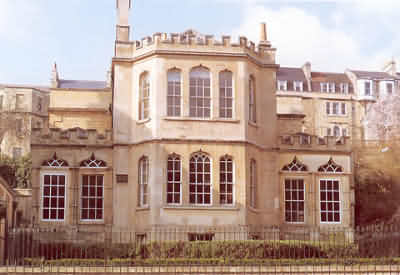 notAmos Performing Editions 1 Lansdown Place East, Bath BA1 5ET, UK +44 (0) 1225 316145 Performing editions of pre‑classical music with full preview/playback and instant download |
Printable cover page (PDF), €0.00 for unlimited copies Download this item
If you have any problem obtaining a PDF, please see our help page. If that does not resolve the issue, please click here.
Click on the illustration to display a larger version

This work, Milgrove : Thou shepherd of Israel and mine : scoreid 106842, as published by notAmos Performing Editions, is licensed under a Creative Commons Attribution-ShareAlike 4.0 International License. All relevant attributions should state its URL as https://www.notamos.co.uk/106842.shtml. Permissions beyond the scope of this licence may be available at https://www.notamos.co.uk/about.shtml.
Milgrove was Precentor of the Countess of Huntingdon's Chapel in Bath (see illustration). This setting comes from "Twelve hymns and a favourite lyric poem written by Doctor Watts; set to music for four, and five voices, with organ accompaniments.... " Printed for the author, and sold at his house in Bond Street, Bath, 1781. The general congregation (sometimes divided into men and women) should sing the Air, accompanying harmonies to be taken by the choir.
Lyrics: Charles Wesley
Thou Shepherd of Israel, and mine,
The joy and desire of my heart,
For closer communion I pine,
I long to reside where thou art:
The pasture I languish to find
Where all, who their Shepherd obey,
Are fed, on thy bosom reclined,
And screened from the heat of the day.
Ah! show me that happiest place,
The place of thy people's abode,
Where saints in an ecstasy gaze,
And hang on a crucified God;
Thy love for a sinner declare,
Thy passion and death on the tree:
My spirit to Calvary bear,
To suffer and triumph with thee.
'Tis there, with the lambs of thy flock,
There only, I covet to rest,
To lie at the foot of the rock,
Or rise to be hid in thy breast;
'Tis there I would always abide,
And never a moment depart,
Concealed in the cleft of thy side,
Eternally held in thy heart.
Thou Shepherd of Israel, and mine,
The joy and desire of my heart,
For closer communion I pine,
I long to reside where thou art:
The pasture I languish to find
Where all, who their Shepherd obey,
Are fed, on thy bosom reclined,
And screened from the heat of the day.
Ah! show me that happiest place,
The place of thy people's abode,
Where saints in an ecstasy gaze,
And hang on a crucified God;
Thy love for a sinner declare,
Thy passion and death on the tree:
My spirit to Calvary bear,
To suffer and triumph with thee.
'Tis there, with the lambs of thy flock,
There only, I covet to rest,
To lie at the foot of the rock,
Or rise to be hid in thy breast;
'Tis there I would always abide,
And never a moment depart,
Concealed in the cleft of thy side,
Eternally held in thy heart.

